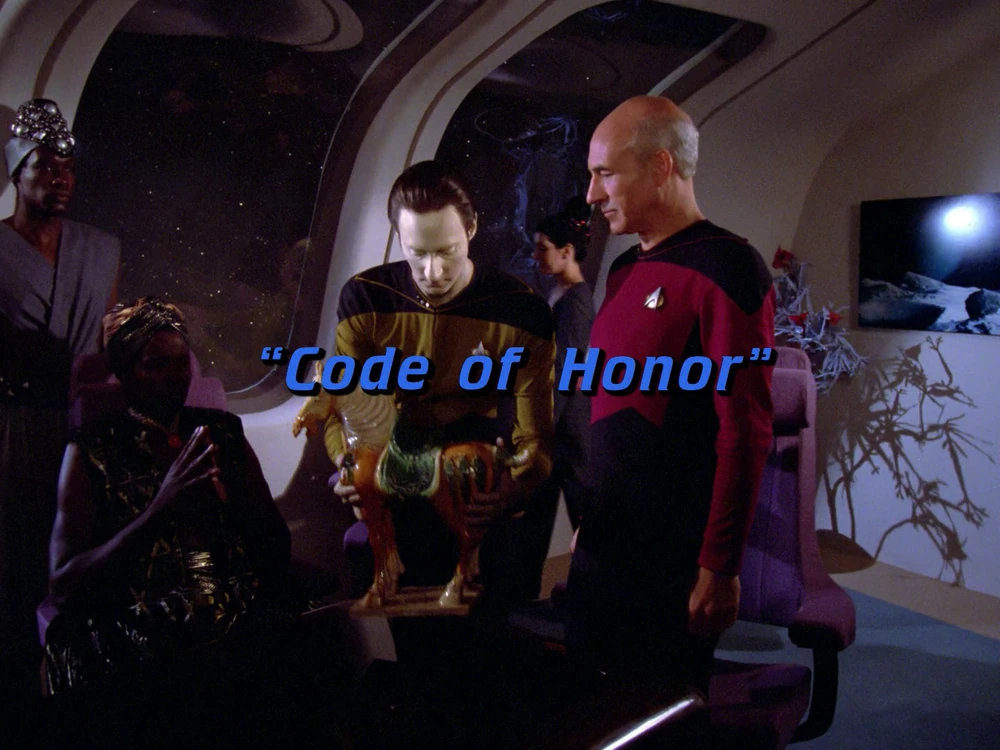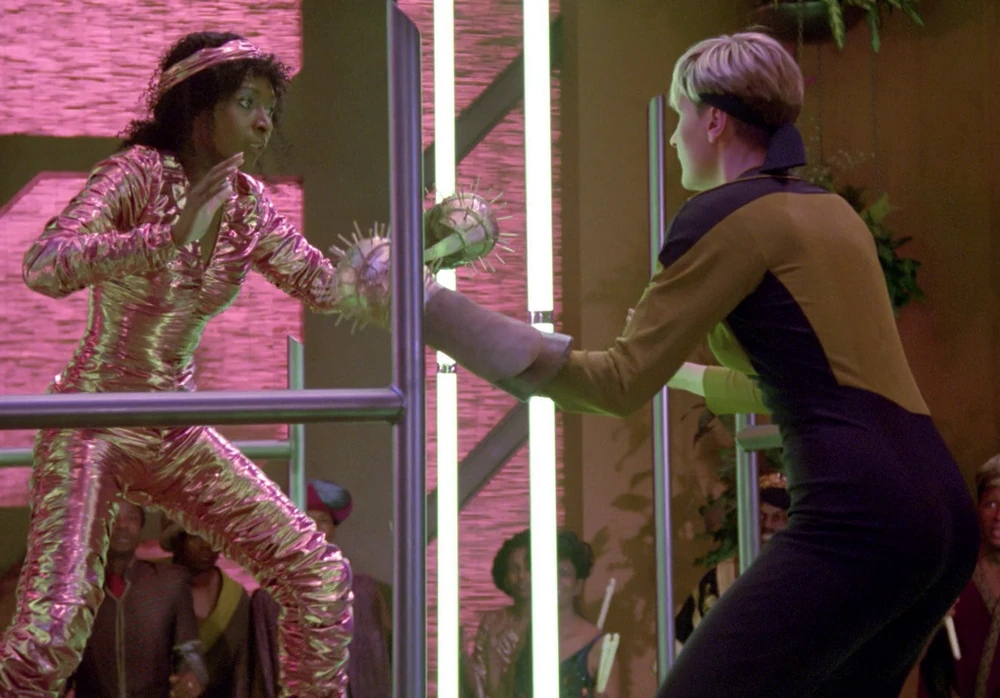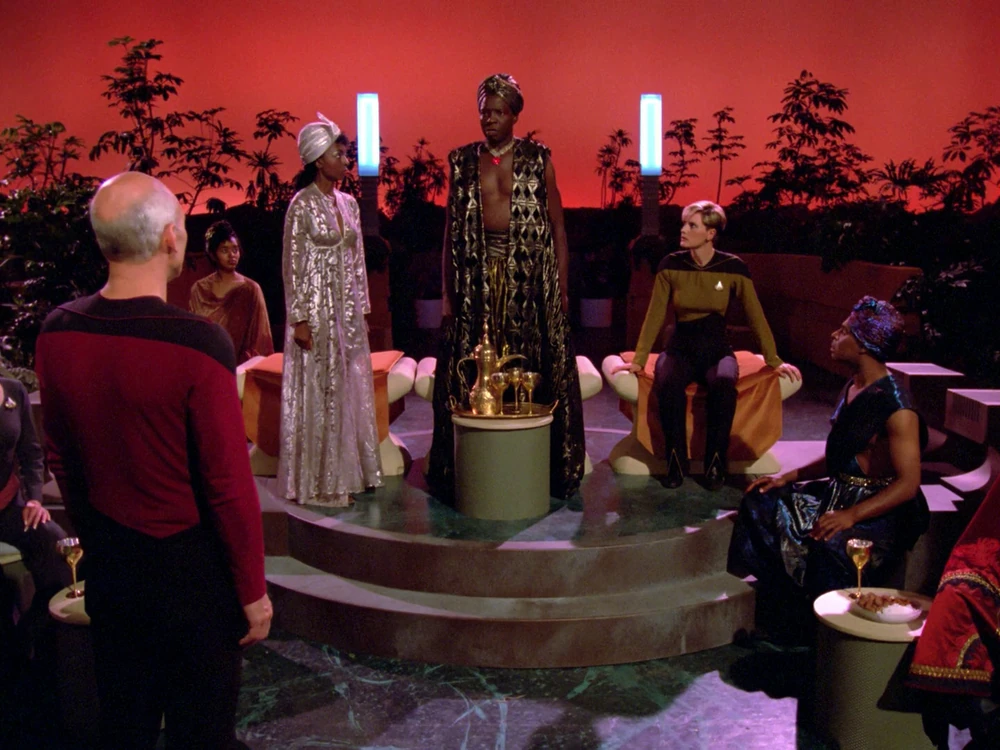Star Trek: The Next Generation’s first season is often considered to be a bad season of Star Trek overall. But perhaps the worst episode of them all is Code of Honor. Though it may not have been intentional, the episode comes across as racist and feels like it doesn’t belong in a progressive show like Star Trek.
The Cast’s Verdict
Code of Honor, the third episode of the first season of The Next Generation, isn’t just considered to be the worst episode by fans. At VegasCon11 Jonathan Frakes referred to the episode as a “racist piece of shit.” Also, in a interview with TrekMovie.com, Brent Spiner stated that:
It [“Code of Honor”] was just a racist episode. Maybe not intentionally but it felt that way and looked that way. It was the third episode so it was fortuitous that we did our worst that early on and it never got quite that bad again.
Brent Spiner, 2012
So what makes Code of Honor such an infamous failure, both morally and dramatically?”
Code of Honor
The episode in question sees the crew of the Enterprise travelling to Ligon II in order to negotiate for a vaccine needed to save another planet. After Lutan, leader of the Ligonians, kidnaps Tasha Yar, Picard is forced to navigate their primitive “Code of Honor” in order to get her back.
As negotiations come to a close, Lutan declares that he wants Tasha Yar to become his “First One”, and Yareena, his current First One, responds by challenging Tasha Yar to a battle to the death. The fight is drawn out, but eventually Tasha Yar wins, killing Yareena.

Tasha and Yareena are both beamed back to the Enterprise where Doctor Crusher uses Federation medicine to bring Yareena back to life. When Lutan follows them, she explains that since she was dead, she is no longer his First One as is their custom. And, since women own the land in their society, she gets to choose a new leader for the Ligonians.
The new leader then agrees to provide the vaccine to the Federation, happy that he now has a First One, and a society to protect.
“Racist Piece of Sh*t”
So what exactly is racist about this episode? The problem is in the portrayal of the Ligonians themselves.
As a race they present as African, and are portrayed as primitive with rigid tribe-like customs. Given that Worf doesn’t appear in this episode, the crew of the Enterprise is very white, and it feels like it’s leaning into the trope of the civilised white man versus the primitive black man.
The leader kidnapping Tasha Yar and declaring he wishes her to be his “First One” is also very problematic. The idea that a black man might “steal” white women echoes racist propaganda used throughout American history. Given America’s history of slavery, segregation, and racial violence, the imagery is hard to stomach.

The challenge to fight to the death is also something that stands out. Resolving conflicts with deadly violence is something we instinctually relate to more primitive cultures, and it serves to reinforce the well-worn trope of the “primitive other.”
There’s also a few scenes in which the characters say, “if only we didn’t have the Prime Directive.” Non-interference plots are a core Star Trek device, but here it implies they want to impose Federation rationality on a “backward” world. The crew treats the concept of “honor” as primitive while enforcing their own moral superiority. This undermines the enlightened Federation diplomacy the characters are supposed to have, instead making them appear to have a colonial attitude.
This episode stands out precisely because Star Trek was originally conceived to be a series that transcends racism and sexism. It inverts Star Trek’s foundational promise of humanist progress. But how did it end up like this?
How it Became Racist
Like Brent Spiner suggested, I don’t think the episode was intentionally racist. Katharyn Powers and Michael Baron’s original pitch involved a race of reptilian aliens with a society based on the Samurai, rather than the African-based Ligonians we ended up with.
It was director Russ Mayberry who had the entire cast made up of African-American actors, altering the episode to have a more tribal Africa feel. What started out as a TOS-style plot transformed into a racialised narrative.
Some articles I’ve found suggest that Mayberry wanted to recontextualise the story around racial politics, and that this casting and racism was intentional. However, I can’t find any primary sources on this, so we can only guess the reason behind it.

Mayberry would be fired from his position after this. According to a blog post made by Wil Wheaton in 2012, Mayberry’s on-set behavior was reportedly so offensive that Gene Roddenberry dismissed him mid-shoot:
I’ve read that the Ligonians were not explicitly described as entirely African American in the script, but were cast that way at the behest of director Russ Mayberry, who apparently went on to be so offensively racist and treated the actors so poorly that Gene fired him before the episode was completed
Wil Wheaton, 2012
Whether intentional or not, the episode was finished by assistant director Les Landau, who would go on to become a prolific Star Trek director.
Emancipation
Episodes like Code of Honor remind us that good intentions aren’t enough for progressivism, especially in science fiction. When surface diversity isn’t matched by structural awareness, utopian ideals collapse into stereotypes.
There are a couple of Data moments that I like in this episode. He has a couple of great comic relief moments, including one where he starts a technobabble explanation, only to be stared down by Picard before he realises what he is saying is irrelevant.
It makes me think of a running gag in Stargate SG-1, where Carter is constantly shut down by O’Neill, who just wants to know if she can do something without an explanation of how.
Speaking of which, Katharyn Powers would go on to write Emancipation, Stargate SG-1’s third episode, based on the same story concept. It’s also considered one of the worst episodes of its series, but is it really as bad as people remember?
Well, watch this space, because next week I’m going to talk about that episode.




One thought on “That Racist Episode of TNG”